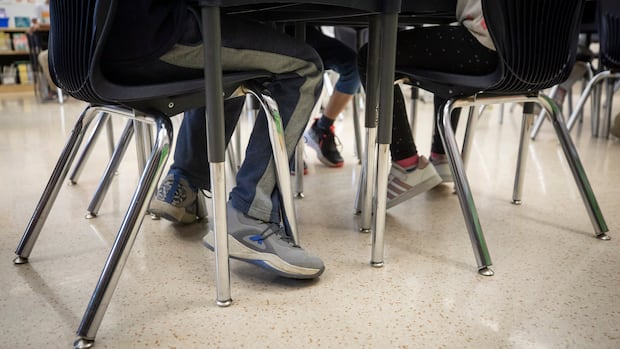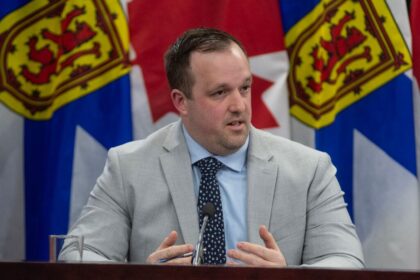Nova ScotiaAdvocates for First Nations children say Ottawa’s latest budget has them concerned about the future of Jordan’s Principle, despite assurances from the minister of Indigenous Services Canada (ISC) that funding will continue.Initiative provides equal access to health and education services for First Nations childrenJane Sponagle · CBC News · Posted: Nov 26, 2025 4:21 PM EST | Last Updated: 2 hours agoListen to this articleEstimated 6 minutesThe audio version of this article is generated by text-to-speech, a technology based on artificial intelligence.A file photo shows students sitting at their desk at school. Jordan’s Principle provides funding to First Nations children for educational services like tutoring or speech language pathology. (Ben Nelms/CBC)Advocates for First Nations children say Ottawa’s latest budget has them concerned about the future of Jordan’s Principle, despite assurances from the minister of Indigenous Services Canada (ISC) that funding will continue.Jordan’s Principle is not a federal program but rather a legal responsibility that ensures the needs of First Nations children are met through government-funded services, without delay. It’s named after Jordan River Anderson, a boy from Norway House Cree Nation in Manitoba. He had multiple disabilities and died in hospital in 2005 while waiting two years for the federal and provincial governments to decide who would pay for his at-home care.Now when governments disagree about who is responsible for providing services to First Nations children, they must help the child first and argue over the bills later.This year’s federal budget earmarked $1.033 billion for continued support for Jordan’s Principle, marking the end of a five-year commitment.With no new money in the budget, Jordan’s Principle front-line worker Kelly Holley said she was worried the writing was on the wall. She wants to see the initiative redeveloped so proper funding can be allocated.“I think what Indigenous Services Canada, in my humble opinion, needs to do is to develop a long-term sustainable model before they develop a budget,” said Holley, who is the Jordan’s Principle Unama’ki manager for the Union of Nova Scotia Mi’kmaq.“I think they’re doing it backwards in my opinion. They’ve developed a budget and they are going to force children into those parameters. I think they need to do it the other way. They need to sit down with First Nations. They need to develop a long-term sustainable model and then attach a budget to it.“Putting children first, not last.”Minister promises to ‘improve and reform’ initiativeHolley says a backlog within the initiative is a serious issue that needs to be addressed. She says she sees an average of about 2,300-2,500 applications in Cape Breton each year, and of those requests last year, only about half were processed, leaving the remaining families waiting for support.She says nationally, there is a backlog of 140,000 applications.Holley said another part of Jordan’s Principle requires ISC to process an individual application within 48 hours, but some families wait for more than a year.Funding through Jordan’s Principle can apply to a range of products and services, but accessing speech language pathology, tutoring or getting respite care are some of the most common, she said.She said for families with autistic children with high needs, respite care can take months to get.“We’ve had a couple of instances where families have reached the ends of their ropes and have connected with a child welfare service because of the lack of respite, their stress levels have gone through the roof and they fear that they’re unable to care for their child,” said Holley.Brittany Mathews, the director of reconciliation and strategic policy at First Nations Child & Family Caring Society in Ottawa, has seen similar issues.She says Jordan’s Principle has been life-changing for many First Nations children, but it needs to be improved upon, and that requires funding.“It is very concerning for me to see that Canada is talking about transforming Jordan’s Principle and hasn’t recommitted itself to fully implementing it per the budget,” said Mathews. “But it’s still letting these kids wait, has still not fixed that backlog and that’s having a real impact on families. The Caring Society still has not heard back from Indigenous Services Canada on an evidence-informed, reasonable plan that fixes the backlog in a way that is respectful of children and families.”Indigenous Services Canada Minister Mandy Gull-Masty says annually funded programs and services like Jordan’s Principle will continue uninterrupted as they are reformed. (Marie-Laure Josselin / Radio-Canada)In a statement to CBC News, Indigenous Services Canada Minister Mandy Gull-Masty says the government has an obligation to continue funding core programs like Jordan’s Principle and will take the necessary time to improve and reform the initiative with community.“Let me be clear — annually funded programs and services will continue uninterrupted throughout that process,” Gull-Masty said.Holley says she’s encouraged Gull-Masty has committed to supporting Jordan’s Principle, but is cautious because of changes ISC made earlier this year.In February, ISC issued an operational bulletin that narrowed its range of eligible requests. The bulletin says the changes were needed to help with long-term sustainability. “To make sure resources are used in line with Jordan’s Principle, requests must relate to achieving substantive equality for First Nations children,” it says.“Due to the significant increase in the numbers of requests, ISC is implementing new ways to process requests to expedite decision-making and address the increased demand.”Holley agrees changes have to be made to make Jordan’s Principle sustainable, but said there’s no evidence to support why the government made these particular changes.She says advocates have worked with Ottawa think-tank, the Institute for Fiscal Studies and Democracy, to put together “Considerations for the Sustainability of Jordan’s Principle,” which was released in August 2025. The document outlines seven recommendations on how to restructure the initiative to improve sustainability, consistency in delivery and address gaps.“We have put forth multiple, multiple suggestions for how Jordan’s Principle could be long-term sustainable for our families,” she said, adding that it’s her understanding that government has yet to consider the recommendations.Holley said she would welcome a visit from Minister Gull-Masty to Cape Breton, adding that there are families ready to speak with her so “she can learn the good, the bad and the ugly of Jordan’s Principle.”She said it has done an enormous amount of good and wants Gull-Masty to see that.“But we would also want her to know the hardship that the decisions Indigenous Services Canada is making, the hardships that this is imposing on the families, the very families that they are supposed to be helping.”MORE TOP STORIESABOUT THE AUTHORJane Sponagle is a journalist with CBC in Halifax. She previously reported from the Yukon, Nunavut and the Northwest Territories for over a decade. You can email story ideas to her at jane.sponagle@cbc.ca.
Advocates worried about the long-term future of Jordan’s Principle











